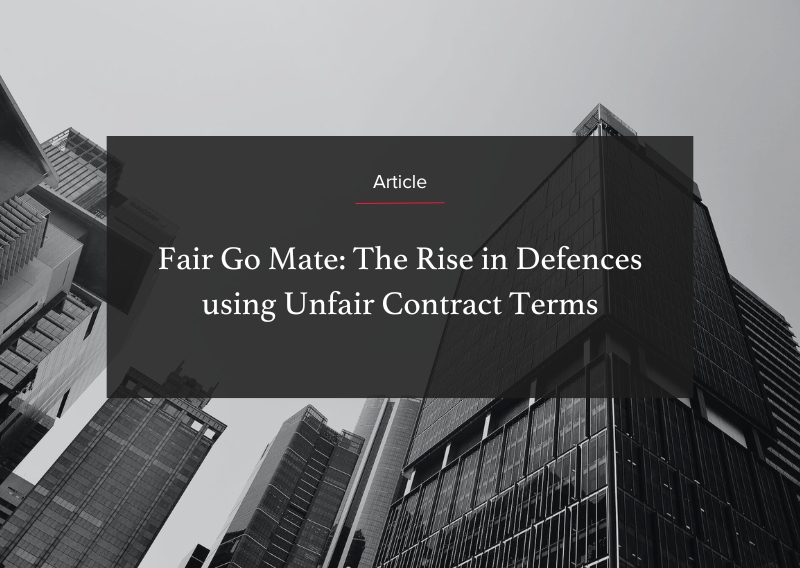The increased use of the Unfair Contract Terms Regime as a defence in legal claims during debt recovery is not a coincidence. It’s a result of economic growth softening, the end of COVID-friendly terms, and changes in penalties.
In this article, we explain why this trend is happening, how to assess the validity of this growing legal defence strategy, and our approach to support credit managers and financial decision-makers in identifying invalid claims.
Contributing Factors to this Trend
Several factors contribute to this uptick in defences, with the state of the economy being the most significant.
Principal Anna Taylor outlined that “usually there’s no genuine basis to the defence and it is a delaying tactic. Typically, we see this where there is some pain in the economy, and businesses do not have the capacity to pay,
“We are finding that a defendants’ frequency in employing this defence is directly linked to their ability to meet their financial obligations.”
“The recent legislative changes updating the Unfair Contract Terms Regime have introduced higher penalties for non-compliance, pushing the regime to the forefront of legal strategies,” Anna finished.
When Is this a legitimate defence?
Some claims appear valid; however, we are seeing an increase in claims being made that Unfair Contract Terms (UCTs) exist with the contract framework in circumstances where the terms are not unfair, and claims are made only to complicate the process and inflate costs for the plaintiff.
To determine the validity of using the Unfair Contract Terms Regime as a defence in commercial disputes, it is necessary to examine the specific circumstances of each case and consider Section 24 of the Australian Consumer Law.
This section outlines three key elements that define an unfair contractual term:
-
- Significantly Imbalanced Rights and Obligations: A term that creates a substantial disparity in the rights and obligations of the parties involved (section 24(1)(a)).
- Lack of Reasonable Necessity: The term is not reasonably necessary to protect the legitimate interests of the party who would be advantaged by the term (section 24(1)(b)).
- Potential for Detriment: the term would cause detriment, whether financial or otherwise, to a party if it were to be applied or relied upon (section 24(1)(c)).
If a defence is raised that does not articulate how the contract terms meet the criteria mentioned above, it could indicate that this defence is being used as a delay tactic.
For this article, we’re addressing the rise in defences filed where the debtor has not clearly shown that they meet the criteria mentioned above.
Unsure if your standard form contracts protect you from this defence strategy?
Reach out to our commercial law and contracts specialists to undertake a free review of your trading and standard form contracts
Proactive Steps to Limit Delays
To tackle this trend, we are being proactive in clearly stating our client’s stance and informing the defendants that their position isn’t strong.
We are also predicting the likely result of a summary judgment or trial based on our client’s stance and responding accordingly.
We have shared this recent example of this trend rearing its head.
Across the board, we are seeing a high settlement rate, and as such, we know that the issue is largely one of capacity to pay.
CASE
A debtor defended a legal action for a large unpaid debt using Unfair Contract Terms, but upon investigation, it was found that the legislation was not applicable, and the claims were weak.
After responding in detail to the defence and foreshadowing summary judgment, we efficiently resolved the issue for the owed amount and legal costs.
In this instance, it was clear that the defence was a tactic to delay the litigation until payment was possible.
What can you do to protect your business today?
There are three things we recommend you implement to safeguard your business and protect it.
- Review your standard form contracts today. Prevention is better than litigation. Make sure that your standard form contracts, credit agreements, supply contracts and terms of trade are compliant with the Unfair Contract Terms regime.
- Be proactive and protect your business in the event of a default. We can help put appropriate settlement terms in place, with escalation and security provisions to protect your business in the event of a subsequent default.
- Seek specialist legal advice to prevent successful spurious claims of UCT. Results Legal has a team of specialist solicitors who can review your current contracts and advise you on any potential issues. We can also assist in drafting new and compliant contract terms to protect your business from future claims of UCT.
Don’t let spurious claims delay or derail the progress of your business, take proactive steps today to safeguard against them.






